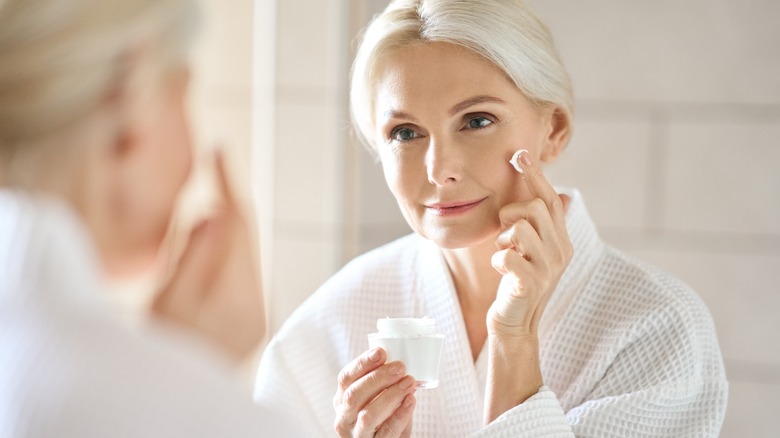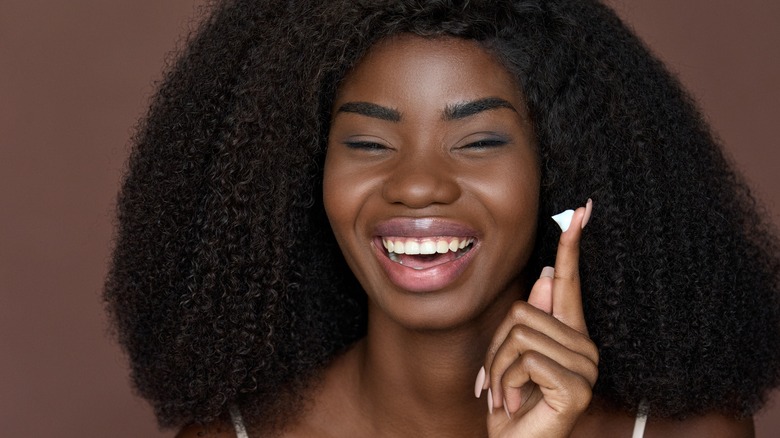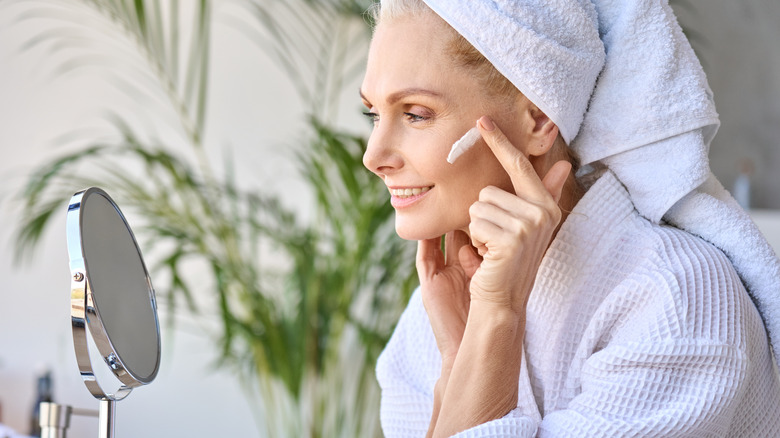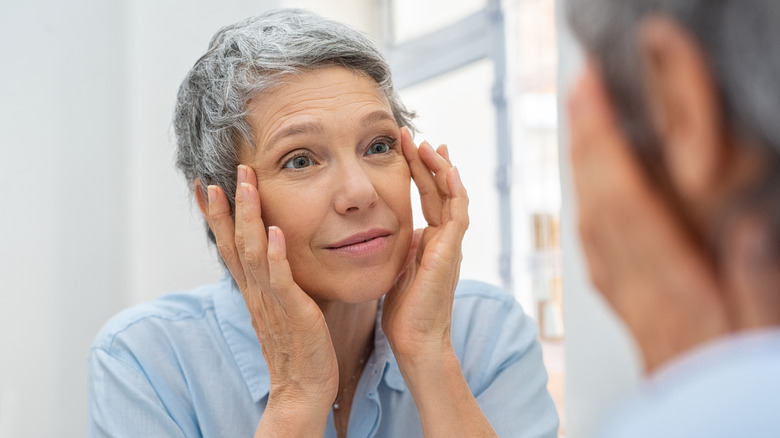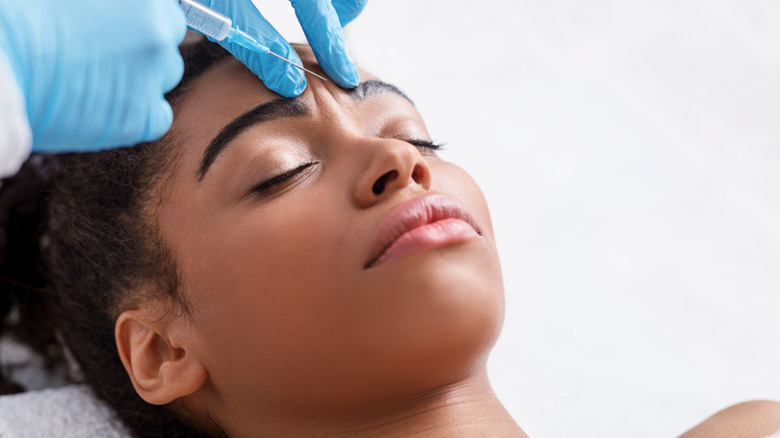The Best Way To Treat Fine Lines, Based On Your Age
We may receive a commission on purchases made from links.
In a now-viral TikTok video, @kalenthenomad made one thing clear: "I hope I don't age gracefully." According to the content creator, she wants "eye wrinkles and cheek wrinkles from laughing and smiling too much, and sun spots from spending too much time outside." However, if the current skincare market, which is worth almost $100 billion, is any indication, most people disagree. Anti-aging products have been around for hundreds if not thousands of years.
Cleopatra used milk baths to soften her skin, and the Spanish explorer Juan Ponce de León went on a quest to find the fountain of youth in the 1500s (allegedly, it's in Florida — check it out for yourself in St. Augustine). Whatever your personal feelings on aging, it's important to protect your skin from sun damage, work towards developing a well-balanced diet, and cut back on smoking and drinking too much alcohol.
Aside from delaying the appearance of a fine line or two, this will factor into your overall health as you age. That being said, if wrinkles are your top concern, you're certainly not alone. SWNS Digital reports that a whopping 54% of women between the ages of 35 and 44 worry about developing wrinkles. Here's what you need to know about preventative skincare depending on your age, from college to retirement. The fountain of youth might be a myth, but Botox and sunscreen definitely aren't.
Early-stage wrinkles can be prevented with SPF
Your younger years are all about preemptive skincare measures. In fact, "What you do in your 20s is going to affect you going forward for decades," Dr. Ellen Gendler, a New York-based board-certified dermatologist, warned on TikTok. "I feel there are four really important things that you should start using in your 20s," she added, identifying sunscreen, prescription retinoids, topical DNA, and vitamin C as absolute musts.
Over time, the sun can break down collagen in our skin, decreasing its elasticity. From here, you may notice some drooping around your eyes and cheeks and — especially if you're in the habit of tanning — discoloration. Generally, doctors suggest wearing ⅓ teaspoon of facial sunscreen daily (even if you're inside, driving, or enjoying the shade). You should be wearing a shot glass worth of SPF on the rest of your body too. Dr. Gendler also recommends using prescription retinoids like Retin-A or Tretinoin, which encourage cell turnover and help with collagen production.
What's more, retinoids can also do wonders for persistent acne — check with your doctor to see what dosage is right for your skin. Although backed by somewhat-limited research, topical DNA solutions like ISDN's SPF 50 advertise the ability to repair DNA damage caused by the sun and air pollution. Finally, vitamin C and other antioxidants are also helpful when it comes to collagen production and hyperpigmentation.
Think about your diet in your 30s
Our 30s are often associated with settling down, buying our first home, and maybe even starting a family. You may also start to notice those first few wrinkles taking shape around your eyes and forehead (not to mention considerably heightened hangovers). When it comes to fine lines in your 30s, don't underestimate the power of a well-balanced diet. Invest in fresh produce rich in vitamin C, find tasty ways to cook dark, leafy greens, and eat fish high in omega-3 fatty acids.
The American Academy of Dermatology Association recommends limiting excess sugar and refined carbohydrates too. Keep in mind that regular alcohol consumption and smoking can also speed up signs of aging, so it's time to get creative with non-alcoholic drinks. As simple as it sounds, cleansing twice a day does wonders for your pores. Dermatologist Dr. Suchismita Paul recommended a mild glycolic or salicylic acid solution to her TikTok followers. Likewise, continue with your antioxidant and retinoid routine, don't slack on sunscreen, and keep your skin hydrated with a favorite moisturizer.
Millennials take note: As board-certified dermatologist Dr. Joshua Zeichner, M.D., pointed out to InStyle, "The increased use of mobile devices has led to a phenomenon known as tech neck." In other words, "We are bending our heads down and folding the skin on the neck now more than ever." Considering below-the-chin wrinkles are occurring in younger and younger patients, moisturizer should be applied just as liberally on your neck.
Focus on retaining moisture in your 40s
It's never too late to start a skincare routine, even if you're already dealing with fine lines and wrinkles. First and foremost, it's time to upgrade your collection of hydrating products. "Because skin thins and dries in the 40s due to decreased estrogen, most women also need more moisturization during this decade," board-certified dermatologist and dermatologic surgeon Jennifer Herrmann informed Byrdie. "Simple products that are fragrance-free and formulated for sensitive skin tend to be my go-tos."
She added, "Hyaluronic acid is another skin hydrator that binds water and keeps skin looking dewy and young." Although this won't necessarily help with long-term wrinkle prevention, it will improve the immediate appearance of fine lines. Under-eye bags? Rubbing them will only lead to increased hyperpigmentation. Instead, gently apply moisturizer and concealer, or, if you really feel like splurging, a caffeine eye cream.
If you have discoloration and dark spots from years of sun exposure, even out your skin tone with the help of vitamin C, a chemical peel (approved by your dermatologist, of course), in-office laser therapy, or microdermabrasion. Finally, at the risk of sounding like a broken record, don't neglect that SPF. Pro tip: Apply antioxidant serums before sunscreen for increased efficacy.
Hormones change in your 50s
Our hormone levels drastically change in our 50s. Menopause usually enters the picture between the ages of 45 and 55 and, on top of hot flashes, it can lead to thinning skin, a dramatic loss of collagen, and wrinkling. "The cell-renewal process slows down as we enter our 50s, leaving older, duller cells that stay on the skin's surface longer," board-certified cosmetic dermatologist Dr. Dendy Engelman outlined during a chat with The Strategist. If you're not already using retinoids, now's the time to start.
Further, ceramide-based products — like this viral CeraVe hydrating cream — can help to fortify your skin barrier and build up a forcefield against outside germs. Your 50s are also a great time to commit to a regular exercise routine, as even a quick walk can increase blood flow and improve the immediate appearance of your skin. A 2014 study from McMaster University in Ontario indicated that exercise can improve your long-term skin health. It could even reverse certain signs of aging (via The New York Times).
Finally, to more immediately erase those fine lines and wrinkles, face tape can be just as effective as Botox. Buy your own adjustable tape from Amazon, and apply it before your morning skincare and makeup routine.
To Botox, or not to Botox?
If you've experimented with your fair share of topical ointments, exercise plans, and fishy dinners, and you're looking to freeze your face in time, Botox might be for you. On the market since the late '80s, Botox can be used to both prevent and treat fine lines. It's also been known to help with migraines, excessive sweating, and even muscle spasms.
Double board-certified plastic surgeon David Shafer, M.D., is a big fan. As he explained to Cosmopolitan, "[Botox is] an excellent treatment for the prevention of wrinkles and it can help soften existing ones too." Furthermore, other in-office treatments like lasers can decrease the appearance of hyperpigmentation and textural irregularities, while facial fillers can bring back that volume we lose as we age.
Ultimately, the world of cosmetic dermatology has come a long way. Over 4 million people get some form of Botox each year, per Elite, another couple million get fillers, according to CNN, and facelift candidates have grown increasingly younger. However, given how much procedures like Botox cost, and the potential complications, they aren't for everyone. If you want to stick to sunscreen, a good diet, and drinking plenty of water, that works too.
